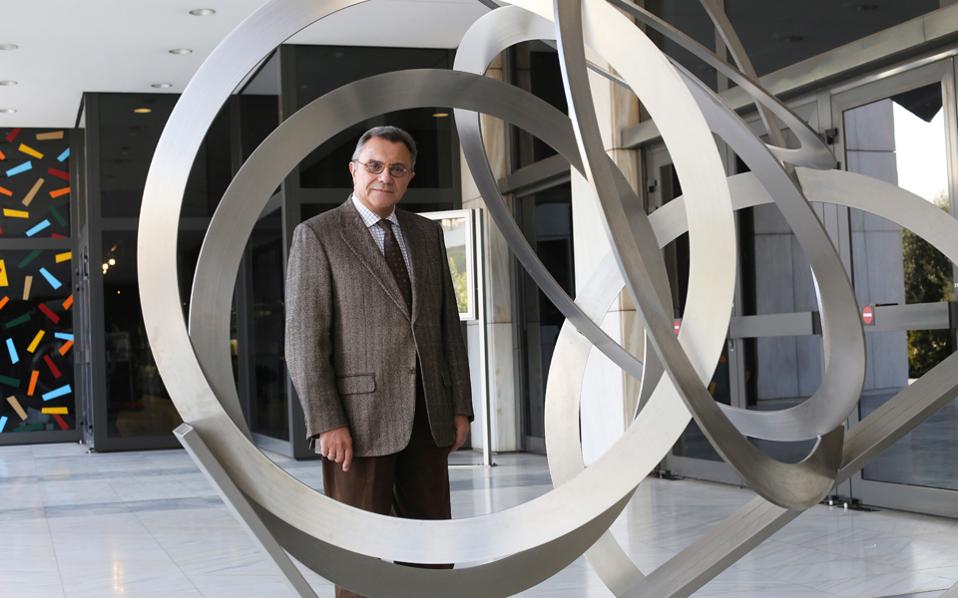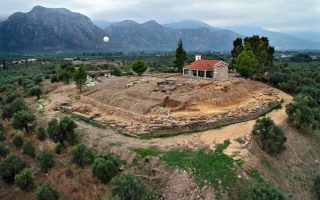Athens Concert Hall director sets the record straight

Yiannis Manos is under tremendous pressure at the Athens Concert Hall. When he took over as the institution’s president five years ago, he could hardly imagine the situation at the organization would reach today’s critical state.
When the cultural institution – known in Greek as the Megaron – was established in 1991, it became a cliche to say that the Athens Concert Hall put Greece on the international music and cultural map. The tune is quite different nowadays, when rumor has it that the organization might be closing its doors or that it’s still standing despite all the problems. The fact is that paying off exorbitant loans in tandem with reduced funding have led to tangible consequences: a smaller calendar of events and unpaid staff.
Manos arrived well prepared for our interview. He was eager to discuss solutions and differentiate between the facts and the lies. He was adamant that the institution’s problems were due to loans taken out in the past and that the best argument for its survival were its 350,000 spectators.
Figures appeared to be the first and last thing on Manos’s mind. Even when he seemed to want to move away from the “logistics” and discuss his artistic vision for the venue, that did not last long, given that the unpaid bills are mounting and the situation is worsening.
Despite the fact that a majority of MPs (258) recently ratified Article 53 – which provides the institution with tax and social security clearance, essentially giving it a new lease on life – Manos is not complacent.
According to him the new legislation did not provide a permanent solution but was more of a “litmus test for the future.” And although Manos is known for carefully choosing his words, there were moments when he seemed to forget himself.
The discussion began with a few facts: The Athens Concert Hall is a private legal entity supervised by the Ministry of Culture. Staff salaries, public utility bills and the cultural programming are covered by the organization’s budget, 50 percent of which is paid for by the state. The rest is the responsibility of the organization.
“The Megaron’s financial woes are not due to its operation and management. That was never the case. They are the result of past loans which cannot be written off,” noted Manos. “The state has to pay them back, even if the Megaron closes, because it is the guarantor.”
Why is it that when we discuss the Megaron these days we only talk about its finances?
Because I’m only dealing with the financial aspect now, although my initial vision was quite different. The property’s value is over twice that of its loans. We estimate that the property is worth 900 million euros, while the loans exceed 300 million euros. Based on the solution which is being promoted the state will own the property and will also control the board.
Why does the Athens Concert Hall stir such heated discussion?
In the early days, it was very much about class. The idea was that it was addressed to a specific social class, the elite. Up until 2010, when I took over, the organization had 10 million visitors. Are all these people the country’s elite? There was a period when going to the Megaron was fashionable, when people came to see and be seen. That was during the days of prosperity. There are also those who love classical music.
When we spoke back in 2012 you said the National Opera could not use the organization’s Trianti Hall for free. Did the initial refusal to host the National Opera and the Athens State Orchestra prove a mistake?
Using the premises free of charge was out of the question. The Athens State Orchestra is now a resident orchestra – an initial agreement is expected to be signed in the coming days. They are moving in and they will be covering their operational costs (power, water and cleaning services). In return, we will develop co-productions.
Will things improve following the ratification of Article 53?
Certain clarifications are in order. The organization’s board of directors was granted an extension of its mandate in order to meet our obligations and get the remaining state funding. We applied for some emergency funding, similarly to other organizations, in order to cover our tax, social security and salary expenses. Besides the loans, the Megaron has overdue debts, money owed to artists, orchestras and the Public Power Corporation (PPC). We owe PPC 3.8 million euros. Our monthly power costs come to 100,000 euros for 170,000 square meters. The last five years have been an unrelenting financial struggle. I would like to be judged based on a three-year plan, as opposed to the financial situation. Our strength is the 350,000 people who attends our events annually. Who are these people? Is it the elite? About 50,000 people attend concerts in the gardens. Are they all in high heels and fur coats? The opening to the public of the gardens gave the Megaron a new perspective.
Why is it that sensible decisions are taken only when the situation reaches a critical stage?
Because we all have fixations. It was a mistake not to allow the Greek National Opera to come to the Megaron. We need cultural synergies. Everyone matters. Why not get together with other cultural organizations and work on a series of package deals for different performances and events? Why not develop a Spring Festival, leading to the Greek Festival?
Would you consider leaving your position as president?
It’s an unpaid position. I don’t earn a single euro. I made a career in law. Georgios Papandreou, to whom I was close to when I was young, used to say to me, “If you get involved in politics, your biggest strength is to be prepared and keep your resignation letter in your pocket.” The Athens Concert Hall is poor, it’s alone, but it is strong. Its strength is those 350,000 people. Once we’ve solved the problems, I would like to get the opportunity to carry out my vision for the organization. For the theater museum to work together with the music library, for instance, to work with Greek choreographers, to develop a dance hall. Meanwhile, the organization is home to Southeastern Europe’s largest conference center, capable of hosting up to 9,000 participants in 16 halls. This is a contributing factor to the capital’s development as a hub for conference tourism.
It seems you’re calling for help as you’re going down.
To begin with, we are not going down, because, thankfully, we are counting on the support of 350,000 people. I don’t believe any government would allow such an institution to close; on the contrary, they should assist it to operate more efficiently. As soon as I took over I could see the dead end.
In 2010 we talked about the Athens Concert Hall opening up to the city. How much ground has been covered since then?
Very little. We are just about to agree on some form of collaboration with the City of Athens. But there has been tremendous pressure on a daily basis in terms of saving the Megaron and safeguarding jobs.
What would you say you’ve learnt in the last five years?
That in many cases a vision cannot keep up with reality, that no matter how hard you try it’s very difficult to be loved by everyone around you, that no matter how hard you try it’s impossible to persuade everyone. But I’m not complaining. I’m still here.





